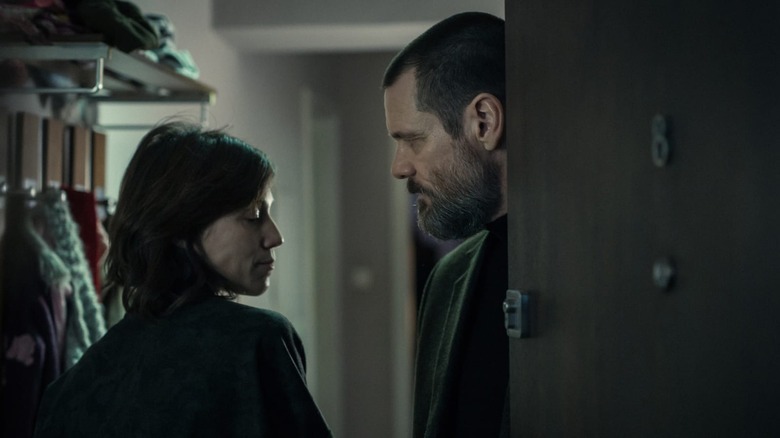The Jim Carrey Movie With A Depressing Rotten Tomatoes Score Of 0%
Alexandros Avranas' 2018 film "Dark Crimes," starring Jim Carrey, was extrapolated from a true crime article published in the New Yorker in 2008. The article, post-modernly called "True Crime," was written by David Grann, and it told the story of a Polish novelist named Krystian Bala who murdered a small business owner named Dariusz Janiszewski in the year 2000. For three years, the police were unable to solve the case, and Bala seemed to have gotten away with it. Bala, perhaps feeling smug about his ability to evade detection for so long, decided to poke the bear a little bit. In 2003, he published a crime novel called "Amok," wherein he wrote a fictionalized version of the Janiszewski murder, including intimate details that only the killer could have known. Bala depicted his fictional self as a badass nihilist who loved quoting Nietzsche and didn't care about human laws, man. "Amok" was a big hit, and inspired a Polish feature film in 2017.
Some newly found physical evidence, however, paired with the details in "Amok," eventually led to Bala's arrest. He was prosecuted and is currently serving a 25-year prison sentence. In a grim twist, Bala was said by the police to be working on a second novel ... as well as planning a second murder specifically to serve as a tie-in promotion.
In 2018, the Bala story was adapted into "Dark Crimes." In the film, Marton Csokas played a fictional version of Bala, now named Kozlov, and Jim Carrey played Tadek, the detective on his trail. Despite the fun meta-narrative twists in the story, the "Dark Crimes" film is merely dour, bleak, and dull. It offers no spin on a predictable and well-worn cop-becomes-obsessed narrative.
It's the only Jim Carrey film to sport a 0% approval rating on Rotten Tomatoes.
Dark Crimes is the mildewiest film of 2018
The plot of "Dark Crimes" strays quite far from the true story that inspired it. Carrey plays a cop who is a former shell of his former self, a sunken-eyed walking skeleton who hates his job, hates his wife, and hates his kid. He finds new life when investigating a murder in an underground nightclub devoted to violent public sex acts. Tadek's investigations lead him to the Csokas character, as he knows a lot about the way the underground Polish sex industry seems to function. Csokas knows a lot about the murder. Maybe a little too much.
Tadek, meanwhile, starts to become obsessed with underground sex clubs, and begins having a strange relationship with the Csokas character's ex-girlfriend, played by Charlotte Gainsbourg.
The issue with "Dark Crimes" is that Tadek's obsession with violent sex clubs doesn't seem to be motivated by anything. Tadek is too hollow-eyed and detached to appear to be getting a prurient thrill from them, nor does his righteousness gland activate, causing him to develop humanity or warmth in opposition to the bleak, sexy underground. He and Csokas have a few conversations about how the world is meaningless and nothing can be solved, but even their mutual nihilism isn't presented as darkly appealing.
Nihilism can be alluring, of course. Ask any 16-year-old. Also, hopeless, nihilistic films can be exhilarating; indeed, be sure to check out the American Cinematheque's Bleak Week. But "Dark Crimes" doesn't seem to understand even that much. It merely presents a world of violence and crime and populates it with barely-walking skeletons who, to be quite frank, are deathly dull to watch.
Reviews were unilaterally terrible, with some critics give it a 0 out of 10. In my own 2018 review, I gave it a 3.
What the critics had to say
Glenn Kenny, writing for RogerEbert.com, gave the film one star, praising Carrey's commitment, but saying that it was "in the service of a movie that is not just muddled in the conventional ways but down to its core; it really never figures out what it's about, even as it grimly manipulates its volatile content."
In Slant Magazine, Henry Stewart wrote that the film "moves through [its] material in gloomy, flat-footed fashion, with the moody aesthetics of someone who considers music videos from the 1990s to have been the height of cinematic achievement." He notes that the opening scene is a riff on Mark Romanek's music video for Nine Inch Nails' "Closer." It can't be a coincidence that "Closer" also played over the opening credits of David Fincher's "Seven" in 1995. Stewart also found the philosophical conversations in the film to be half-hearted at best and its treatment of women to be "blatantly misogynistic, as well as unimaginatively repulsive."
Johnny Oleksinski, for the New York Post, called "Dark Crimes" "an exercise in vulgarity." Ignatiy Vishnevetsky, writing for the AV Club, was unimporessed with Carrey's understated performance, feeling it to be blank rather than subtle. "A few words should be said about Carrey's performance," he wrote, "It may be the worst dramatic acting of his career, a charmless cartoon of self-repression."
Carrey, best known for his physical comedy, exploded in popularity in 1994, appearing in the hit films "Ace Ventura: Pet Detective," "The Mask," and "Dumb and Dumber," all within a few months. After several years of unstoppable success, he started to diversify, appearing in smaller, weirder, or darker films. "Dark Crimes" was the low point of his experimentation, as well as his popularity.
His only films since have been "Sonic the Hedgehog" movies.


